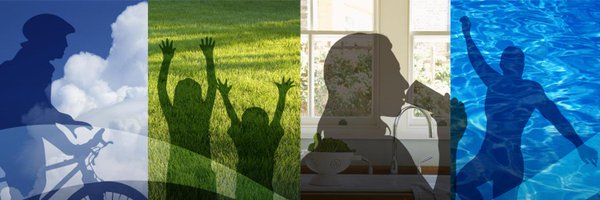
CDC Environment
@CDCEnvironment
Info from @CDCgov & #ATSDR on how your environment affects your health. Following/being followed ≠ endorsement.
Did you know you can be struck by lightning even if there’s no rain? If you are caught outside with no safe shelter nearby: ⚡️Move off elevated areas ⚡️Move away from water ⚡️Stay away from objects that conduct electricity More lightning safety tips: bit.ly/45ydjOw

Is there wildfire smoke in your area? 🔥Pay attention to your local weather forecast & air quality at airnow.gov 📢Follow emergency management instructions 🏡Stay inside if authorities tell you to do so. More ways to protect your health: bit.ly/4ctb7K0

Wildfire smoke can lead to health risks such as trouble breathing, asthma attacks, headaches, and chest pain. Keep track of wildfires and air quality near you so you can stay safe. More wildfire safety tips: bit.ly/3LxsA9n
Heat can make anyone sick. But some are more sensitive. Check on your friends and family, especially those who: ☀️are over 65 ☀️are pregnant ☀️don’t have access to air conditioning ☀️have a chronic illness. More tips: bit.ly/3TwewAE

Protect yourself and those you love when it's hot outside: 🆒Stay Cool 💧Stay Hydrated 🤒Know the Symptoms of Heat-related Illness Hot days can affect anyone. Follow these tips: bit.ly/3TwewAE

When using a generator, follow these safety tips: 🚫Never use a generator indoors or in enclosed spaces 🪟Keep generator at least 20 feet away from windows, doors & vents 🔋Install a battery-powered CO detector 📔Read manufacturer’s instructions Tips: bit.ly/3XNppQq

Did you know? People who work outdoors are more likely to become dehydrated and get heat-related illness. 🥤Drink plenty of water. 🆒Take breaks to cool off. 🤒Seek medical care if you have symptoms of heat-related illness. More tips: bit.ly/4eWaI5k

Did you know? Temperatures inside a car can rise almost 20°F in only 10 minutes, even with a window cracked open. NEVER leave children or pets in a parked car. Children left alone in parked cars are at greatest risk for heat stroke. bit.ly/43QfcHk
Be lightning aware and remember: 💧Avoid water ⚡️Don't touch electronic equipment 🌩️Check the forecast 🏠When thunder roars, go indoors More lighting safety tips: bit.ly/3z9Uhlr

Have you prepared for hurricane season? Gather emergency supplies such as food, water, medicine, flashlights, and other essentials. Store them in a safe area and have them ready in case of a hurricane or other natural disaster. More tips: bit.ly/4lTQbRH

Are you prepared? Hurricane season began June 1st in the Atlantic and Caribbean. Make a plan: bit.ly/4lTQbRH

Stay cool this summer! If you’re not used to working or exercising when it's hot, start slowly and pick up the pace gradually. Rest often in shady areas so your body has a chance to recover. Discover more heat safety tips: bit.ly/40THZpt

Protect pets and livestock during wildfires. When there’s smoke, bring pets inside and have a plan for your livestock. Don’t forget to include all animals in your evacuation plans. More animal wildfire safety tips: cdc.gov/wildfires/safe…

Heat exhaustion symptoms include: 🚩 nausea 🚩 muscle cramps 🚩 heavy sweating 🚩 cold, clammy skin If you or someone else has these signs, move to an air-conditioned place and get medical help if symptoms get worse. More heat safety tips: bit.ly/3TwewAE

Be air aware! Check the Air Quality Index (AQI) at bit.ly/3zUbtqB and adjust your outdoor activities to reduce your exposure to harmful air pollutants. Air quality safety tips: bit.ly/4h9SQUP

Just a few hours in air conditioning can help your body stay cooler when you go back outside in the heat. Find an air-conditioned place near you when it's hot. More ways to keep cool during the heat: bit.ly/4k9arNN

Protect others from the heat! NEVER leave kids or pets in a parked car. Cars can quickly heat up to dangerous temperatures, even with a window cracked open. More heat safety tips: bit.ly/44iUNtg

Wildfire smoke can lead to health risks such as trouble breathing, asthma attacks, headaches, and chest pain. Be ready to protect yourself before, during, and after a wildfire with these tips: bit.ly/4kSJG1d

Wildfire smoke can lead to health risks such as trouble breathing, asthma attacks, headaches, and chest pain. Be ready to protect yourself before, during, and after a wildfire with these tips: bit.ly/4kSJG1d

Do you have a plan for hurricane season? Preparation can keep you and your family safe when a tropical storm or hurricane strikes. Know your evacuation route. Check out CDC’s tips to stay prepared: bit.ly/44RRLhE
